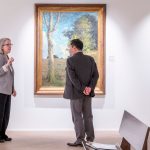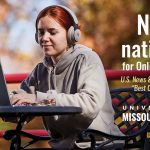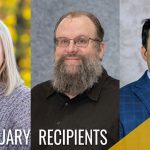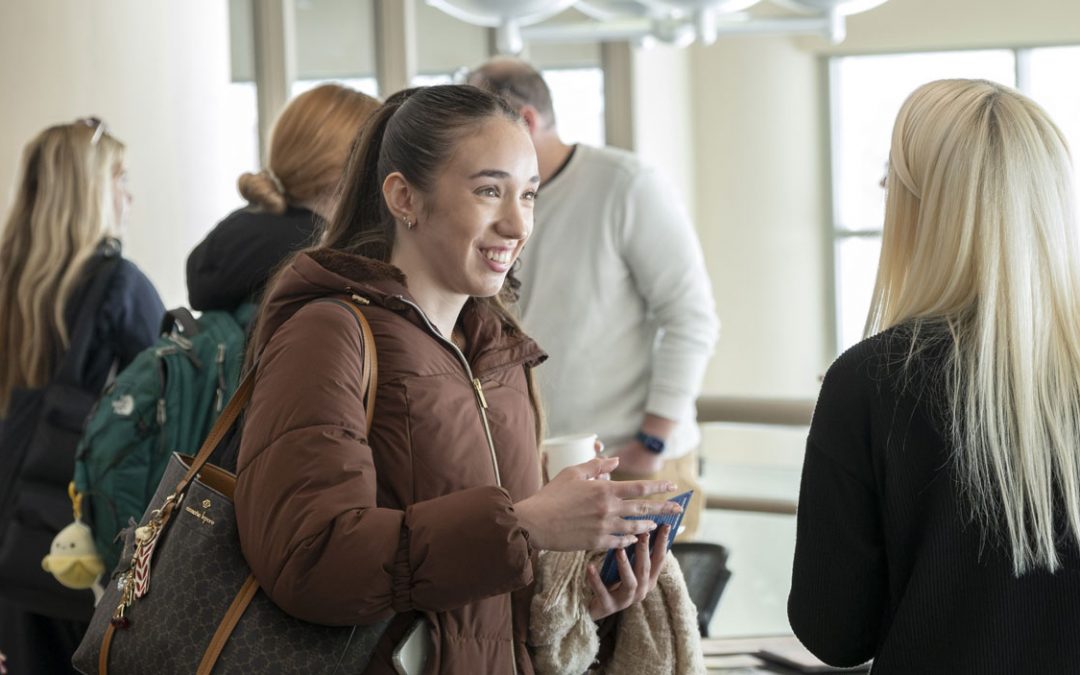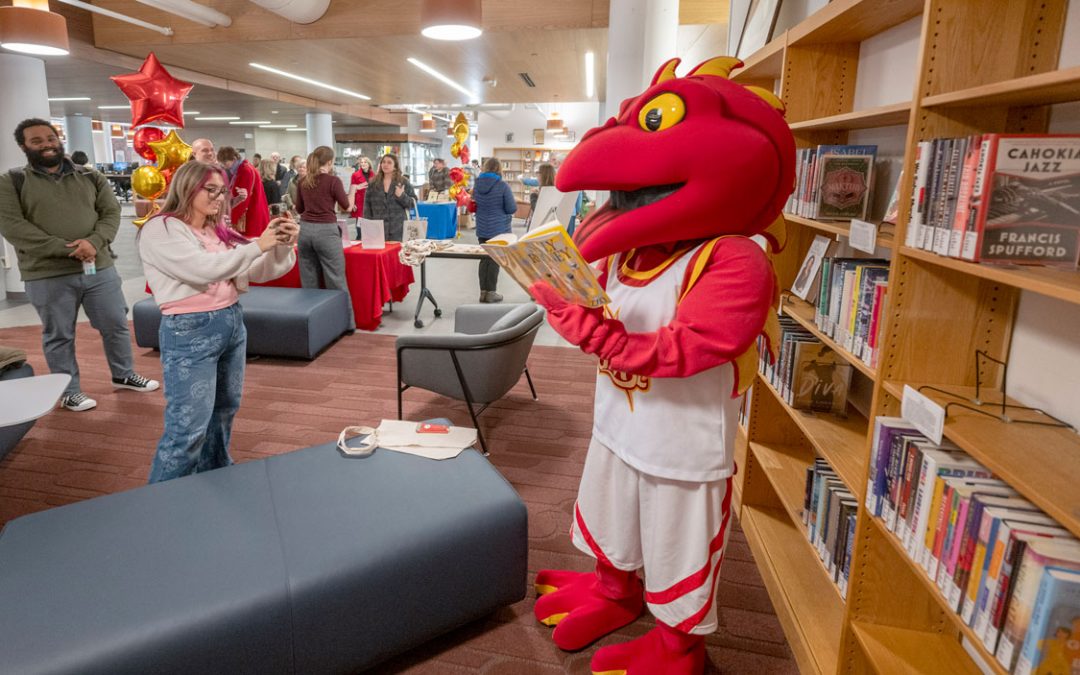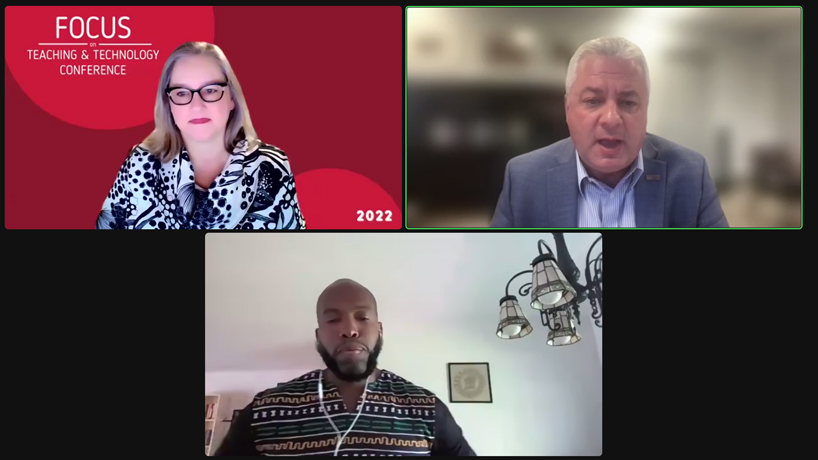
Keeta Holmes (top left), assistant vice provost for academic innovation and director of the Center for Teaching and Learning at UMSL, and Provost and Interim Vice Chancellor for Academic Affairs Steven Berberich (top right) welcomed Bryan Dewsbury (bottom) during the Focus on Teaching and Technology Conference last week. Dewsbury, an associate professor of biological sciences at Florida International University and Gardner Institute Fellow, delivered the keynote address on Friday during the annual conference. (Screenshot)
Bryan Dewsbury vividly remembers arriving at Morehouse College in Atlanta, Georgia, for orientation week.
The experience was intense for Dewsbury, a first-generation college student from Trinidad and Tobago. At week’s end, his parents sat with him in the middle of campus before departing.
“At the end of this, they sat me on this bench and said, ‘Bryan, we’ve taken you as far as we can. Good luck,’” Dewsbury recalled. “At the time, it felt like very strange parting words. But what I would come to realize is that for first-generation college students, the capital that you can get from your parents sometimes ends on the first day of class.”
Dewsbury is now an associate professor of biological sciences at Florida International University, Gardner Institute Fellow and the principal investigator for the Science Education and Research program. Last Friday, he recounted his initial struggles as an undergraduate student unfamiliar with American higher education while delivering a virtual keynote address for the Focus on Teaching and Technology Conference, hosted by the University of Missouri–St. Louis’ Center for Teaching and Learning.
In the hourlong address titled, “Power, Practice, and Pedagogy – Classrooms as Spaces for Inclusion and Equity,” Dewsbury discussed rethinking inclusivity in the classroom. Drawing on his experiences as a first-generation student, he argued that being inclusive must go beyond the content of a course – it must also be about the relationships educators and students build with each other in preparation to participate in society.
“When I think about inclusive classrooms, I don’t necessarily think about the subject matter that you discuss,” he said. “I don’t necessarily think about the grades that you hand out or the textbooks that you read from. I am not saying those things are not important. But I’m seeing the inclusive classroom as one where the individual is free to dream, free to imagine, free to envision various versions of themselves as they look toward the future.”
Nearly 300 educators – mostly higher-education faculty members from across the St. Louis region and beyond – registered to hear from Dewsbury and the other presenters last week in what was the 21st annual Focus on Teaching and Technology Conference.
“It’s a timely, engaging topic everywhere right now,” said Jennifer McKanry, the conference co-chair and the assistant director of the Center for Teaching and Learning. “Our classrooms are a challenging place right now with a lot of the division going on in the country. We all need guidance on how to open up conversations, how to make everyone feel a part of the classroom and like they belong.”
McKanry and her co-chair, Keeta Holmes, assistant vice provost for academic innovation and
director of the CTL, made the decision last spring to hold the conference virtually for the third year in a row. It was a difficult choice, but McKanry said UMSL is aiming to host the conference in person in 2023.
This year, they decided to strategically pare down the conference from three days to two. McKanry said they shortened each day and offered fewer concurrent sessions, allowing attendees to space out their schedule and participate in more sessions. She added that a lunch hour was built into the schedule to give attendees time to rest and to avoid Zoom fatigue.
“Those were changes we made as a result of feedback from previous groups,” she said. “We’re trying to be conscientious of wanting to not just feel like you’re sitting in Zoom meeting after Zoom meeting, but really that you’re building that community and you’re truly attending a conference.”
Dewsbury’s address Friday morning was just one of many important sessions during the conference. During the presentation, Dewsbury pointed to three things that can foster an inclusive classroom and drive civic engagement: dialogue, inquiry and critical consciousness.
He joked that his introduction to biology class is “more about the intro than the bio” and stressed that science is done by, and with, people. To encourage healthy dialogue, he mixes up his students in groups, so they’re guaranteed to interact with people different from themselves.
“Social growth is made more real and goes further when you have real structured opportunities to learn from somebody else who came from a different background than you,” he said. “I am not just going to assume that because these people exist on campus, that growth will happen. My goal is for you to learn from your colleagues.”
Furthermore, Dewsbury explained that he implemented a simple change to make it easier for students to ask questions and get help. He changed “office hours” to “student hours,” which he holds in large common areas at different times, so as many students as possible can attend. Lastly, he believes it’s important for his students to interrogate the ways in which science and power are connected to build critical consciousness.
In addition to the keynote, McKanry touted Thursday’s teaching panel, “Effective Teaching: Tips from Award-Winning Teachers,” which covered topics including academic challenges, learning with peers, experience between students and faculty, high-impact practices and supportive campuses and learning environments. The conference also provided asynchronous opportunities to engage, including a series of Tech Tracks videos that reviewed free tech tools that can be incorporated into teaching.
McKanry was thankful for another opportunity to host the conference and credited the university’s partners for its lasting success.
“We have amazing partnerships with so many institutions around the region, and those just continue to grow,” she said. “We’re up to 13 institutional partners now this year, and I think that’s the magic of this conference. It’s an amazing collaborative experience to get to work with all these folks putting this conference together every year.”









